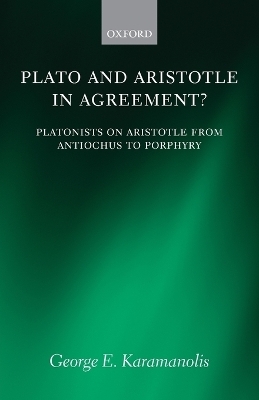
Plato and Aristotle in Agreement?
Platonists on Aristotle from Antiochus to Porphyry
Seiten
2013
Oxford University Press (Verlag)
978-0-19-968463-2 (ISBN)
Oxford University Press (Verlag)
978-0-19-968463-2 (ISBN)
George Karamanolis examines the interplay of the two main schools of thought in ancient philosophy, Platonism and Aristotelianism. He argues, against prevailing scholarly views, that the Platonists turned to Aristotle only in order to elucidate Plato's doctrines, and did not hesitate to criticize Aristotle when judging him to be at odds with Plato.
George Karamanolis breaks new ground in the study of later ancient philosophy by examining the interplay of the two main schools of thought, Platonism and Aristotelianism, from the first century BC to the third century AD. From the time of Antiochus and for the next four centuries Platonists were strongly preoccupied with the question of how Aristotle's philosophy compared with the Platonic model. Scholars have usually classified Platonists into two groups, the orthodox ones and the eclectics or syncretists, depending on whether Platonists rejected Aristotle's philosophy as a whole or accepted some Peripatetic doctrines. Karamanolis argues against this dichotomy. He argues that Platonists turned to Aristotle only in order to discover and elucidate Plato's doctrines and thus to reconstruct Plato's philosophy, and they did not hesitate to criticize Aristotle when judging him to be at odds with Plato. For them, Aristotle was merely auxlilary to their accessing and understanding Plato.
Platonists were guided in their judgement about Aristotle's proximity to, or distance from, Plato by their own assumptions about what Plato's doctrines were. Also crucial for their judgement were their views about which philosophical issues particularly mattered. Given the diversity of views rehearsed in Plato's works, Platonists were flexible enough to decide which were Plato's own doctrines. The real reason behind the rejection of Aristotle's testimony was not to defend the purity of Plato's philosophy, as Platonists sometimes argued in a rhetorical fashion. Aristotle's testimony was rejected, rather, because Platonists assumed that Plato's doctrines were views found in Plato's work which Aristotle had discarded or criticized. The evaluation of Aristotle's testimony on the part of the Platonists also depends on their interpretation of Aristotle himself. This is particularly clear in the case of Porphyry, with whom the ancient discussion reaches a conclusion which most later Platonists accepted. While essentially in agreement with Plotinus's interpretation of Plato, Porphyry interpreted Aristotle in such a way that the latter appeared to agree essentially with Plato on all significant philosophical questions, a view which was dominant until the Renaissance. Karamanolis argues that Porphyry's view of Aristotle's philosophy guided him to become the first Platonist to write commentaries on Aristotle's works.
George Karamanolis breaks new ground in the study of later ancient philosophy by examining the interplay of the two main schools of thought, Platonism and Aristotelianism, from the first century BC to the third century AD. From the time of Antiochus and for the next four centuries Platonists were strongly preoccupied with the question of how Aristotle's philosophy compared with the Platonic model. Scholars have usually classified Platonists into two groups, the orthodox ones and the eclectics or syncretists, depending on whether Platonists rejected Aristotle's philosophy as a whole or accepted some Peripatetic doctrines. Karamanolis argues against this dichotomy. He argues that Platonists turned to Aristotle only in order to discover and elucidate Plato's doctrines and thus to reconstruct Plato's philosophy, and they did not hesitate to criticize Aristotle when judging him to be at odds with Plato. For them, Aristotle was merely auxlilary to their accessing and understanding Plato.
Platonists were guided in their judgement about Aristotle's proximity to, or distance from, Plato by their own assumptions about what Plato's doctrines were. Also crucial for their judgement were their views about which philosophical issues particularly mattered. Given the diversity of views rehearsed in Plato's works, Platonists were flexible enough to decide which were Plato's own doctrines. The real reason behind the rejection of Aristotle's testimony was not to defend the purity of Plato's philosophy, as Platonists sometimes argued in a rhetorical fashion. Aristotle's testimony was rejected, rather, because Platonists assumed that Plato's doctrines were views found in Plato's work which Aristotle had discarded or criticized. The evaluation of Aristotle's testimony on the part of the Platonists also depends on their interpretation of Aristotle himself. This is particularly clear in the case of Porphyry, with whom the ancient discussion reaches a conclusion which most later Platonists accepted. While essentially in agreement with Plotinus's interpretation of Plato, Porphyry interpreted Aristotle in such a way that the latter appeared to agree essentially with Plato on all significant philosophical questions, a view which was dominant until the Renaissance. Karamanolis argues that Porphyry's view of Aristotle's philosophy guided him to become the first Platonist to write commentaries on Aristotle's works.
George E. Karamanolis is Assistant Professor in Ancient Philosophy at the University of Crete.
Introduction ; 1. Antiochus of Ascalon ; 2. Plutarch ; 3. Numenius ; 4. Atticus ; 5. Ammonius Saccas ; 6. Plotinus ; 7. Porphyry ; Appendix I: The Platonism of Aristotle and of the early Peripatetics ; Appendix II: Lists of works by Platonists on Aristotle's philosophy
| Erscheint lt. Verlag | 15.8.2013 |
|---|---|
| Reihe/Serie | Oxford Philosophical Monographs |
| Verlagsort | Oxford |
| Sprache | englisch |
| Maße | 140 x 216 mm |
| Gewicht | 484 g |
| Themenwelt | Geisteswissenschaften ► Philosophie ► Philosophie Altertum / Antike |
| ISBN-10 | 0-19-968463-4 / 0199684634 |
| ISBN-13 | 978-0-19-968463-2 / 9780199684632 |
| Zustand | Neuware |
| Haben Sie eine Frage zum Produkt? |
Mehr entdecken
aus dem Bereich
aus dem Bereich
mit Sokrates, Seneca, Platon & Co. im Gespräch
Buch | Hardcover (2023)
FinanzBuch Verlag
CHF 25,20


